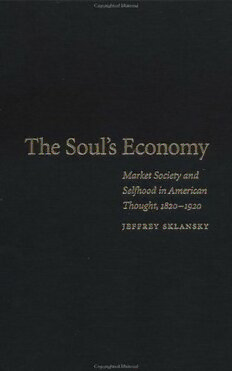Download The Soul's Economy: Market Society and Selfhood in American Thought, 1820-1920 PDF Free - Full Version
Download The Soul's Economy: Market Society and Selfhood in American Thought, 1820-1920 by Jeffrey Sklansky in PDF format completely FREE. No registration required, no payment needed. Get instant access to this valuable resource on PDFdrive.to!
About The Soul's Economy: Market Society and Selfhood in American Thought, 1820-1920
Tracing a seismic shift in American social thought, Jeffrey Sklansky offers a new synthesis of the intellectual transformation entailed in the rise of industrial capitalism. For a century after Independence, the dominant American understanding of selfhood and society came from the tradition of political economy, which defined freedom and equality in terms of ownership of the means of self-employment. However, the gradual demise of the household economy rendered proprietary independence an increasingly embattled ideal. Large landowners and industrialists claimed the right to rule as a privilege of their growing monopoly over productive resources, while dispossessed farmers and workers charged that a propertyless populace was incompatible with true liberty and democracy. Amid the widening class divide, nineteenth-century social theorists devised a new science of American society that came to be called "social psychology." The change Sklansky charts begins among Romantic writers such as Ralph Waldo Emerson and Margaret Fuller, continues through the polemics of political economists such as Henry George and William Graham Sumner, and culminates with the pioneers of modern American psychology and sociology such as William James and Charles Horton Cooley. Together, these writers reconceived freedom in terms of psychic self-expression instead of economic self-interest, and they redefined democracy in terms of cultural kinship rather than social compact.
Detailed Information
| Author: | Jeffrey Sklansky |
|---|---|
| Publication Year: | 2002 |
| ISBN: | 9780807827253 |
| Pages: | 330 |
| Language: | English |
| File Size: | 11.383 |
| Format: | |
| Price: | FREE |
Safe & Secure Download - No registration required
Why Choose PDFdrive for Your Free The Soul's Economy: Market Society and Selfhood in American Thought, 1820-1920 Download?
- 100% Free: No hidden fees or subscriptions required for one book every day.
- No Registration: Immediate access is available without creating accounts for one book every day.
- Safe and Secure: Clean downloads without malware or viruses
- Multiple Formats: PDF, MOBI, Mpub,... optimized for all devices
- Educational Resource: Supporting knowledge sharing and learning
Frequently Asked Questions
Is it really free to download The Soul's Economy: Market Society and Selfhood in American Thought, 1820-1920 PDF?
Yes, on https://PDFdrive.to you can download The Soul's Economy: Market Society and Selfhood in American Thought, 1820-1920 by Jeffrey Sklansky completely free. We don't require any payment, subscription, or registration to access this PDF file. For 3 books every day.
How can I read The Soul's Economy: Market Society and Selfhood in American Thought, 1820-1920 on my mobile device?
After downloading The Soul's Economy: Market Society and Selfhood in American Thought, 1820-1920 PDF, you can open it with any PDF reader app on your phone or tablet. We recommend using Adobe Acrobat Reader, Apple Books, or Google Play Books for the best reading experience.
Is this the full version of The Soul's Economy: Market Society and Selfhood in American Thought, 1820-1920?
Yes, this is the complete PDF version of The Soul's Economy: Market Society and Selfhood in American Thought, 1820-1920 by Jeffrey Sklansky. You will be able to read the entire content as in the printed version without missing any pages.
Is it legal to download The Soul's Economy: Market Society and Selfhood in American Thought, 1820-1920 PDF for free?
https://PDFdrive.to provides links to free educational resources available online. We do not store any files on our servers. Please be aware of copyright laws in your country before downloading.
The materials shared are intended for research, educational, and personal use in accordance with fair use principles.

